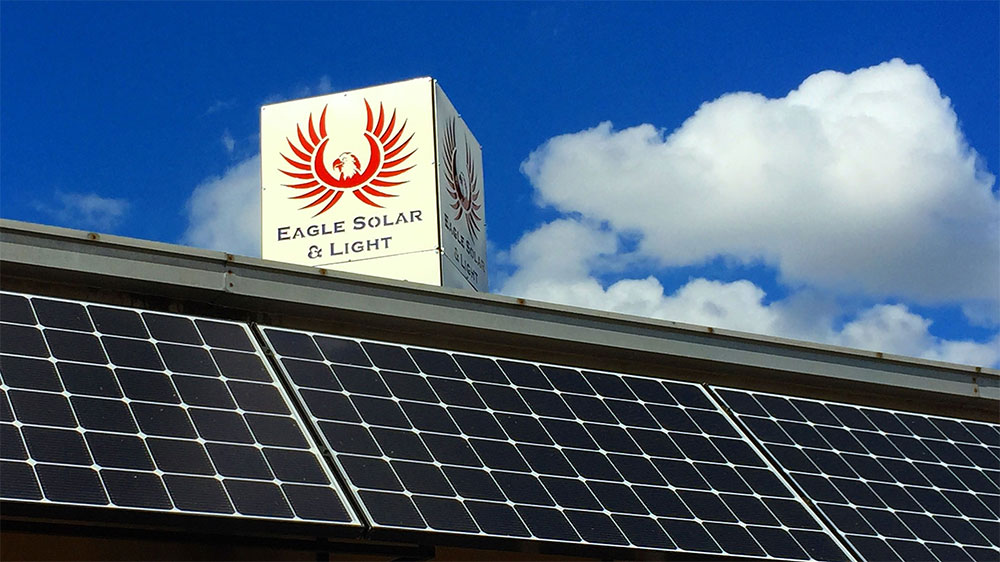Member Highlight: Eagle Solar and Light Expands Solar Energy Access to North Carolina Tribal Community
This feature is part of NCSEA’s celebration of Native American Heritage Month and our ongoing focus on diversity in clean energy. We had the opportunity to talk with Laura Combs, from Eagle Solar and Light, to learn more about the company’s efforts within equity, diversity, & inclusion (ED&I) to develop a presence in marginalized and Historically Under-Resourced communities. Her work with the Lumbee Regional Development Association led to the first solar installation related to a state-recognized tribe in NC earlier this year. Stories like this help illustrate the importance of creating an accessible, affordable future for all.
This article was originally released in June 2022 and was updated in November by Alex Clingman.

Expanding Access to Clean Energy Through Solar Incentives & Leasing
Eagle Solar and Light is a solar installation company, located in Durham, NC and Birmingham, AL that focuses primarily on commercial solar energy installations. Their team believes that access to clean, abundant solar energy is beneficial to society from both an environmental and economic perspective. Laura Combs, Business Development Director and NCSEA Board Member, offered a unique perspective on solar expansion gained from a background in government and nonprofit work, along with a passion for environmental justice issues.
Leasing, as well as a Duke Energy solar rebate, has been critical in helping non-profit organizations install clean energy and redirect energy savings to the core parts of their missions. Since Combs began working at Eagle Solar and Light, she has been in search of ways to expand access to solar energy to marginalized communities. Her efforts have led Eagle Solar and Light to partner with organizations like NCSEA, the Durham Literacy Center, Rebuilding Broken Places (founded by Rev. Dr. William Barber II), and the Lumbee Regional Development Association (LRDA).
Combs also acknowledged the potential that exists with incentives, along with leasing, to make solar more accessible across the US. To note, the Lawrence Berkeley National Laboratory found that more than 40% of available roof space exists in LMI communities. As such, incentives like the Duke Energy solar rebate combined with a lease can have a massive impact on bringing clean energy to Historically Under-Resourced regions in NC and beyond. Combs presented this new research and her company’s successful collaborations within the non-profit sector at the American Solar Energy Society’s 2022 national conference in early August of this year.
The Role of Eagle Solar and Light within the NC Tribal Community
Of the eight tribes currently recognized in NC, just one has achieved federal recognition, excluding the vast majority from receiving federal funding essential for community projects. Combs is adamant that all North Carolinians deserve access to solar, especially those living in tribal communities, which are some of the most economically distressed populations in the country. Driven by this sentiment, she set out to spread awareness to tribal leaders about how Eagle Solar and Light could help them reap the long-term environmental and economic benefits of investing in solar.
The LDRA voiced its interest in solar at one of the meetings Combs initiated with the North Carolina Commission of Indian Affairs and tribal leaders. In this conversation, she helped explain the process of installing solar and gaining cost savings through Duke Energy rebates to Tribal leaders which would make the installation cash flow positive in year one.
Education and awareness are integral to the clean energy equation. Combs emphasized that regardless of whether or not the tribe decided to install solar, she wanted them to be aware of the opportunities that solar could provide to their community. Programs like the Duke Energy Solar Rebate are important incentives to allow NC’s non-profits to install solar, reduce energy bills, and redirect funds to other initiatives.
Building Trust
The relationship between Eagle Solar and Light and the Lumbee Tribe did not happen overnight, but instead, was cultivated after nearly a year and a half of relationship building. Combs explained: “It takes time to build trust in communities that have been historically marginalized.” Thus, time and resources must be allocated to this essential part of expanding solar throughout the state. Further, open and honest conversations are essential to help build trust during this process.
Combs explained that solar installers must authentically seek the needs of the community and keep them at the forefront of the conversations. As such, Combs said that ensuring that communities understand their options and the economic benefit of using solar power is her main goal. Combs also stressed that people should not assume they understand land use in other communities, especially tribal communities. Collaboration, rather than telling a group what to do, is the most effective way to find solutions. Most importantly, she notes parties must remain patient. People must recognize that building trust takes time and that there are many nuances associated with developing solar projects in communities across the state and country.
Moving Forward
Laura Combs is working hard to include voices that have historically been excluded from the clean energy conversation. Expanding access to solar installations and incentives is an important part of this mission. She also noted that making a conscious effort to diversify the workforce, specifically within the solar industry, is another integral step in seeding the long-term benefits of clean energy in LMI communities. This includes diversifying across all levels of involvement, from sales and installation to upper-level management and leadership. Having a workforce that is representative of society and its community members is an irreplaceable way to pursue the sustainability and inclusiveness of solar projects.
Laura Combs was recognized with the Diversity & Inclusion in Sustainable Energy Award at NCSEA’s 2022 Clean Energy Awards in October 2022. We would like to thank her for her insights, as well as for all of the important work she is doing with the LRDA. To learn more about Laura and her work, visit Eagle Solar and Light.

